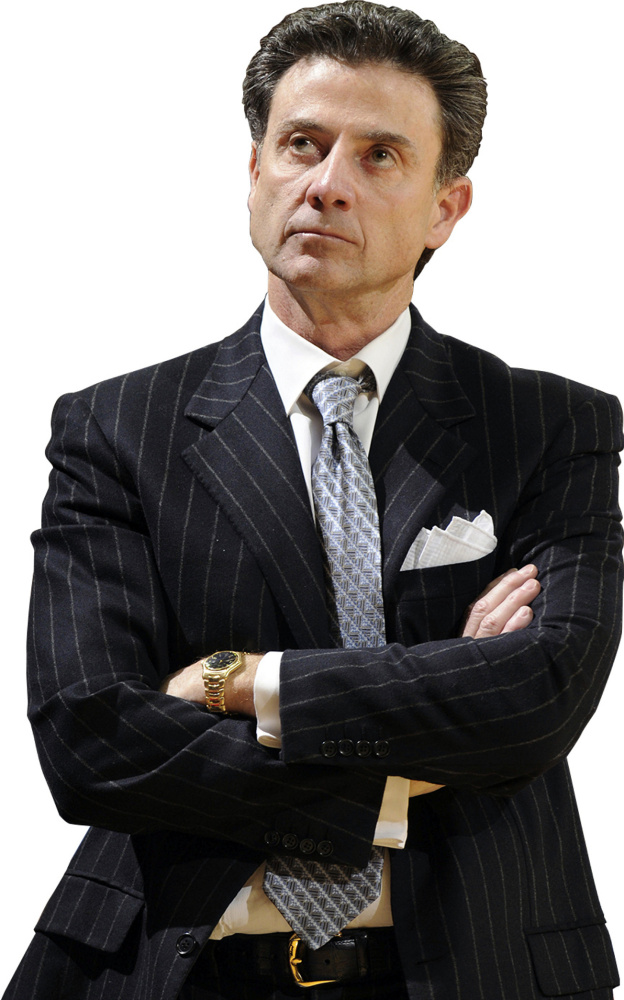In the famous scene in the movie “Casablanca,” Capt. Louis Renault, a corrupt Vichy officer, abruptly shuts down Rick’s Café Américain after patrons of the bar drown out German soldiers singing with a rousing rendition of “La Marseillaise,” the French national anthem.
“I am shocked – shocked – to find that gambling is going on in here!”
“Your winnings, sir,” said the card dealer in response, handing Renault a pile of money he’d made gambling that evening.
And so it is with Rick Pitino, the Basketball Hall of Famer and highest-paid college basketball coach who pleaded ignorance of the facts underlying the recent FBI investigation and criminal complaint filed against four assistant coaches and one Adidas executive accused of bribery of student athletes.
“These allegations come as a complete shock to me,” Pitino said.
“A complete shock”? Pitino was paid $2.25 million directly by Adidas in 2015 as part of his overall salary, which exceeded $7.7 million. What service did Pitino provide to the shoe company to earn such a handsome sum? Hush money may be treated as ordinary income for college coaches, but the quid pro quo is obvious.
If Pitino knew his athletes were being bribed to play for Louisville, he should be fired, and if he didn’t know, he should be fired. The guy in charge is paid to know things, right?
Any responsible coach who took their position of trust seriously would question why Brian Bowen announced June 3 – out of the blue – that he’d decided to play for Louisville, rather than play dumb, as Pitino did. Bowen’s family was allegedly paid $100,000 to get Bowen to play for the Cardinals when NCAA rules prohibit college athletes from earning money from their talent. Bribery by apparel and financial companies was a likely factor in Bowen’s decision and one that any honest coach would at least explore.
“We got lucky on this one,” Pitino told reporters about Bowen’s change of plans – an odd choice of words for the guy who also pretended to know nothing about his then-assistant coach arranging to have teenage boys plied with sex to get them on board. Who is he kidding?
Pitino didn’t know about the bribery of Bowen, just like he didn’t know that for four years, his then-assistant Andre McGee was paying prostitutes to entertain underage recruits during their visits to the Louisville campus and basketball dorm.
“Whether it’s true or not, I don’t know,” Pitino told ESPN at the time.
I don’t know who we protect more by the NCAA rules that bar student athletes from getting paid – the teenage basketball recruits, or the teenage girls brought to the recruits’ dorms by coaches for sex parties and shoe deals. Maybe both college athletes and prostitutes should be paid legally in order to level the playing the field and stop this silly charade.
Big Shoe companies are not much different than Big Pharma – financial sharks circling the waters exploiting children with the help of paid professionals. The money they peddle is like opiates – pushed on these kids by adults whose job it is to protect them. Doctors feted by drug companies hand out addictive drugs like candy, and coaches feted by apparel companies hand out sneakers and cash and girls. American kids deserve better.
The University of Louisville is quaintly referred to as a “public research facility” in the recently filed criminal complaint that caused Pitino to be canned, finally, and the public deserves more from its employees, especially if they are taking home millions of bucks for coaching a sporting event.
Corporate money that corrupts students and is used to exploit them should be policed by people who are paid to know more and know better.
The Adidas deal will pay $160 million over 10 years to Louisville; meanwhile, Under Armour is paying UCLA $280 million over 15 years and Nike is paying $252 million to Ohio State over 15 years and $250 million to Texas over 15 years, according to MarketWatch. With these kinds of checks, why does it still cost the average student over $60,000 to get a degree?
The NCAA and colleges that conspire to corrupt kids are no better than pimps and drug cartels. Let’s stop kidding ourselves that student athletes need or benefit from being denied participation in the “free” and open marketplace. Laws designed by those who profit in the shadows of college sports create a black market, much like the sex trade. Neither “amateur” college basketball players nor those who work in the oldest profession get legally paid for their work, and it makes no sense yet remains very profitable for a certain club.
Your winnings, sirs.
Cynthia Dill is a civil rights lawyer and a former state senator. She can be contacted at:
Twitter: @dillesquire
Send questions/comments to the editors.


